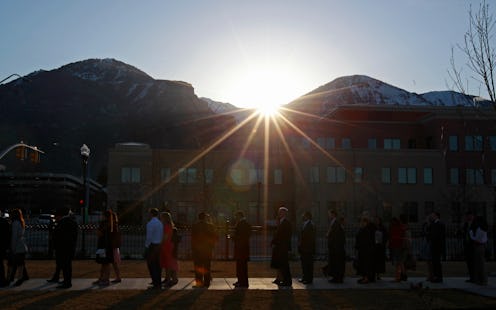On March 22, Arizona, Idaho, and Utah will enter the primary election ring. And judging by the number of delegates offered by each state, this round won't be nearly as dodgy as the other "do or die" elections in the past have been. Instead, it will be memorable thanks to a new tradition pioneered by the Beehive State, which will hold the nation's first ever online elections. Additionally, unlike Arizona's Republican primary, which will be the only winner-take-all event, Utah and Idaho employ a rare winner-take-most system in their Republican elections. Compared to last week's five elections, two of which were decisive winner-take-all primaries, this Tuesday will be a breeze ... if everything goes as planned.
Utah allocates 40 Republican and 37 Democratic delegates. Republican delegates are allocated via a winner-take-most system whereby a candidate can receive all delegates if he manages to win over 50 percent of the vote. If not, then delegates will be proportionally assigned among the candidates who receive at least 15 percent of the vote. If one of them gets less than 15 percent, the delegates will still be allocated proportionally among the rest of the candidates. For the Democrats, it's going to be business as usual. Registered Dems will visit their neighborhood caucus locations and stand up for their candidate of choice. 11 Democratic delegates will be awarded based on the statewide vote, while 22 will be allocated proportionally among the state's four congressional districts. For the Republicans, however, voting requires much less effort this year.
According to The Deseret News, Republicans will have the new option of skipping meetings to vote online instead. To do so, Republicans had to register to vote by March 15. Lauren Littlefield, executive director of the Utah Democratic Party, told the publication that Democrats would also prefer to offer a similar option, but can't afford the price of establishing an official voting website:
We would absolutely prefer a primary for several reasons. When the state runs an election, it's clearly fairly run, and it's really open. It’s easy to participate in ...
Utah's Republican Party has charged each Republican candidate $7,500 to include their name on the online ballot, which cost about $80,000, and asks for $5 donations from each voter. Utah State Sen. Todd Weiler told The Deseret News that achieving broader representation and heightened participation is the main goal behind the move:
I think, hopefully, it will drive a more reflective sample of people to the caucuses. I hope it goes well and we keep on doing it.
If the result of North Carolina's inclusion of an early voting option is any indicator, then the future of voter turnout looks bright for Utah. The Wall Street Journal reported that Utah's Republican online voting "experiment" may attract the largest number of votes the nation has seen, setting an impressive participation-driven precedent for future adjustments to other states' systems. On Saturday, the state's Republican Party projected that at least 30,000 members will vote online alone. The change represents a surprisingly positive outcome of what could have been mistaken as a legislative short sale.
This year, Utah's legislature voted to not fund $3 million to the state's elections. Instead, each of the state's parties were left to organize the events as they wished. Because they possessed the necessary funds, the Republican Party was favorable of the decision, as it allowed them to exercise greater control over the process. Bryan J. Smith, the executive director of the Utah Republican Party, said that the online voting system might be an avenue of heightened recognition for the relatively late-to-vote state:
We’re stepping out on the national stage in a way we never have before. This time it matters in more ways than you think.
Utah isn't a winner-take-all state, but it may set some surprising records in this year's primary election.
